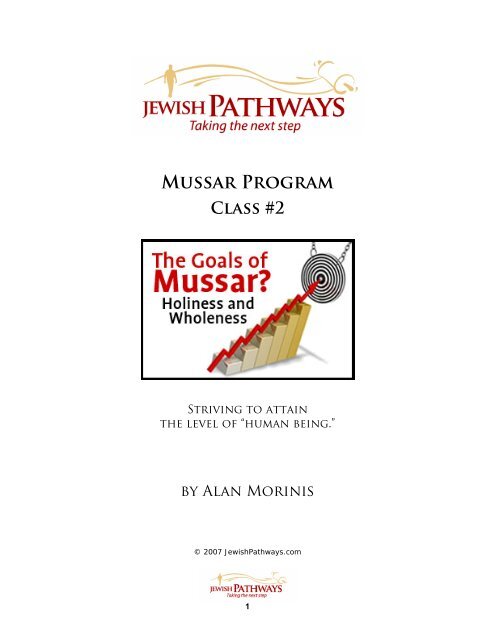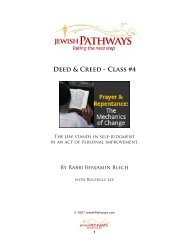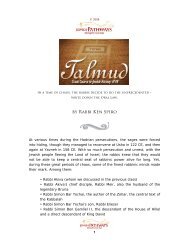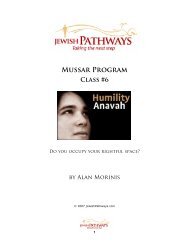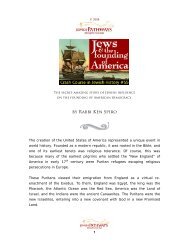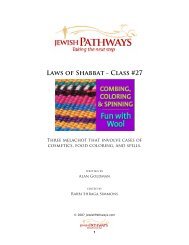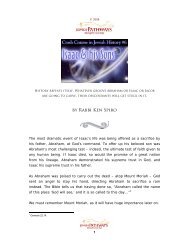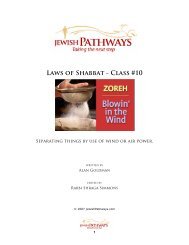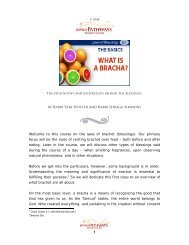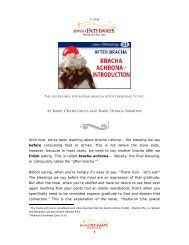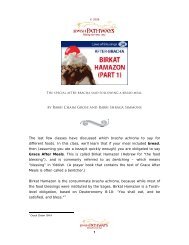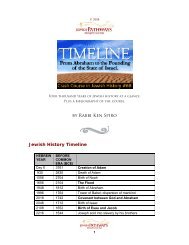MUSSAR PROGRAM ClASS #2 - JewishPathways.com
MUSSAR PROGRAM ClASS #2 - JewishPathways.com
MUSSAR PROGRAM ClASS #2 - JewishPathways.com
Create successful ePaper yourself
Turn your PDF publications into a flip-book with our unique Google optimized e-Paper software.
Mussar Program<br />
Class <strong>#2</strong><br />
Striving to attain<br />
the level of “human being.”<br />
by Alan Morinis<br />
© 2007 <strong>JewishPathways</strong>.<strong>com</strong><br />
1
So far in this course, we have defined Mussar and we have traced its<br />
history within the Jewish world over the past 1,000 years. The study<br />
and practice of Mussar <strong>com</strong>es with goals, and exploring these goals<br />
fills in the picture of what exactly Mussar is and how it applies to real<br />
life.<br />
In several places and in several ways, the Torah repeats a notion that<br />
we find stated most clearly in Leviticus 19:2: Kedoshim tihiyu – "You<br />
shall be holy." Here the Torah is pinpointing for us what a human life is<br />
really all about, as well as what we are meant to do on this earth. It is<br />
telling us that the job of a human being is to “be holy.”<br />
All of Mussar can be understood as an exploration of that injunction.<br />
So now: What does it mean to be holy? What is the path? What are<br />
the obstacles?<br />
At this point, we don't really know what the word "holy" means, and<br />
yet we can still be struck by this remarkable piece of guidance.<br />
Whatever it may be, holiness is surely an elevated state of being. The<br />
Torah's message is that you are here on Earth not to accumulate<br />
wealth, nor gain power, nor bask in prestige, nor acquire possessions,<br />
nor glory in ac<strong>com</strong>plishments, nor revel in your beauty – but rather to<br />
bring forth this quality called "holiness."<br />
And since the Torah instructs us to do this, it must be within our<br />
potential to do so. We learn from this that spiritual elevation is to be<br />
our main aim in life, and that spiritual elevation is possible. Mussar is a<br />
Jewish way to pursue that spiritual elevation.<br />
In telling us that the job description of a human being is to be holy,<br />
the Torah is clearly addressing each and every one of us. The word<br />
kedoshim is written in the plural form. This message of spiritual<br />
elevation is meant to be heard and acted upon by each one of us,<br />
individually. No one can be<strong>com</strong>e holy on your behalf. No one can<br />
elevate your soul except you, in whom it was implanted.<br />
2
Holiness as a Command<br />
I have called the verse "You shall be holy" an "injunction," and in<br />
doing so, I chose my words carefully. It is noteworthy that when the<br />
rabbis <strong>com</strong>bed through the Torah to seek out the <strong>com</strong>mandments that<br />
are the backbone of Jewish life, none of the major codifiers identified<br />
"You shall be holy" as an actual <strong>com</strong>mandment. This omission is<br />
classically explained by saying that holiness is the overarching and allen<strong>com</strong>passing<br />
goal of our lives, and so this injunction can't be brought<br />
down to the level of an ordinance on a par with, say, not eating meat<br />
with milk, or wearing fringes on the corners of clothing, or any other of<br />
the 613 mitzvot in the Torah.<br />
Mussar teachers have offered other explanations for why the Torah's<br />
directive to be holy is not considered a formal <strong>com</strong>mandment. In the<br />
famous story of Adam and Eve, we read what sounds like an explicit<br />
<strong>com</strong>mandment, as God tells them, "Of the Tree of Knowledge of Good<br />
and Evil, do not eat" (Genesis 2:17). Rabbi Yosef Yozel Hurwitz, who<br />
founded and led the Novardok school of Mussar, writes in his book,<br />
Madregos Ha'Adam ("The Levels of Man"), that this directive was not a<br />
<strong>com</strong>mandment to Adam and Eve. Rather, it was an aitzah – God's<br />
good advice.<br />
The same could be said about the Torah's bidding, "You shall be holy."<br />
Not an injunction, this may also be advice. We need this advice to help<br />
us understand an impulse that we all already feel within ourselves –<br />
the drive to improve and to make something better of our lives. Don't<br />
we all feel that drive? Don't we all spend many hours each day fixing,<br />
cleaning, upgrading, improving, reconfiguring, and maintaining various<br />
aspects of our lives? We all <strong>com</strong>mit so much time, thought and effort<br />
into making things better – because we are all born with an impulse to<br />
improve.<br />
Since we live in such materialistic times, we <strong>com</strong>monly express that<br />
impulse to make things better in a purely material way. We can be<br />
constantly busy – changing the color of our hair, straightening our<br />
3
teeth, washing the car, doing the laundry, upgrading the <strong>com</strong>puter,<br />
buying the latest gizmo – spending innumerable hours and dollars<br />
trying to satisfy the inner call to improve.<br />
Because the Torah understands our inner lives, it knows that we have<br />
this drive, and it warns us not to make the terrible mistake of applying<br />
this drive solely within the material realm. The Torah's advice is to<br />
recognize that, more than anything, the impulse to improve is a<br />
spiritual urge, an innate drive toward spiritual refinement. And this<br />
impulse is squandered when it is used up on your clothes or your car.<br />
Instead, the Torah's counsel is aimed directly to the soul: Be holy!<br />
Spiritual Blossoming<br />
What is holiness? An argument over the very verse we have been<br />
discussing – "You shall be holy" – addresses this question:<br />
The medieval <strong>com</strong>mentator Rashi connects the directive to be holy to<br />
the warnings that we find in the previous chapter (Leviticus 18), which<br />
speak of sexual morality. Rashi finds a few verses in the Torah that<br />
demonstrate an explicit connection between the word kadosh ("holy")<br />
and sexual transgressions, and that grounds his view that kadosh<br />
means to separate from that which defiles.<br />
In Rashi's view, holiness is our default position. All we have to do to<br />
get there is to keep away from defilements.<br />
Ramban (Nachmanides), who followed Rashi by a century and a half,<br />
argues that the sort of avoidance that Rashi advocates can't possibly<br />
be enough to bring forth the light of holiness. He points out that there<br />
are many ways to stay within the letter of the law, and yet still behave<br />
like a <strong>com</strong>plete rascal – for example, eating kosher food to gluttonous<br />
extremes, or indulging excessively in permitted sexual relations. He<br />
said famously that a person could be a "scoundrel with the license of<br />
the Torah." To forestall that possibility, the Torah gives us general<br />
guidance to elevate our inner lives in ways that can't be defined by<br />
law, and for which there can be no uniform standards.<br />
4
[The 16th century kabbalist, Rabbi Chaim Vital, explains in Sha'arey<br />
Kedusha 1:2: "The inner traits were not included in the 613 mitzvot,<br />
yet they are integral to them since they are a prerequisite to the<br />
mitzvot themselves. Therefore, the one who possesses inferior inner<br />
traits is worse off than one who is only <strong>com</strong>mitting transgressions.<br />
Since the inner traits are such an important foundation, they were not<br />
included in the mitzvot. Good inner traits lead to mitzvot. One should<br />
be more concerned about his inner traits than his mitzvot."]<br />
Ramban liberates holiness from being understood in a very narrow<br />
sense as a form of behavior. This concept is echoed by Ramchal (Rabbi<br />
Moshe Chaim Luzzatto), in the last chapter of Path of the Just, which is<br />
titled "An Explanation of the Trait of Holiness." Ramchal does not<br />
explain holiness, and this is no failure, because holiness cannot be<br />
defined in simple terms. Our language is limited to describing realities<br />
that are part of the same plane as language, and this is not true of<br />
holiness. Holiness has one foot in earthly reality and another in<br />
supernal realms, and so it defies definition.<br />
For the same reason, it also defies achievement. Yes, holiness can<br />
be<strong>com</strong>e a tangible presence in our lives, but despite that, we can<br />
never claim it as an ac<strong>com</strong>plishment. As Ramchal says, "Holiness is a<br />
twofold matter. It begins in effort and ends in reward. It begins in<br />
striving and it ends in being given as a gift."<br />
Holiness is a spiritual blossoming. It is a quality that <strong>com</strong>es over a soul<br />
that has been made pure and elevated. We can't produce holiness like<br />
we can grow flowers or construct a machine, but it is certain that the<br />
efforts we do make increase our suitability to receive the gift of<br />
holiness. "Readying ourselves" is what Ramchal calls what we can do.<br />
If we have readied ourselves, and if providence delivers us the gift of<br />
holiness, then the heart is transformed and the person be<strong>com</strong>es, again<br />
in Ramchal's words, "a tabernacle, sanctuary and altar."<br />
Mussar is the way to fashion oneself into a vessel to contain this gift of<br />
holiness.<br />
5
Attaining Wholeness<br />
The Mussar teachers don't always speak of the goal of Mussar in terms<br />
of holiness. Sometimes they say that the purpose of Mussar practice is<br />
to help us move in a direction that is fully conceivable within this plane<br />
of reality: the goal of shlemut (or shlemus), literally "wholeness."<br />
Shlemut <strong>com</strong>es from the same root as the word shalom, which is<br />
usually translated as “peace.” That definition, however, lacks the<br />
connotation of wholeness that is prominent in shlemut, and implicit in<br />
peace.<br />
We are not ‘whole’ now, but we could be. As we address each inner<br />
factor that is in<strong>com</strong>plete or unbalanced, we take a step toward making<br />
ourselves more <strong>com</strong>plete, or shalem.<br />
Again we find Ramchal illuminating this notion, in another source,<br />
Da’at Tevunot, where he writes: "The one stone on which the entire<br />
building rests is the concept that God wants each person to <strong>com</strong>plete<br />
himself, body and soul..."<br />
We are created in<strong>com</strong>plete. This isn't a curse, but rather the starting<br />
point for our lives, because we are here on earth in order to <strong>com</strong>plete<br />
the work of our own creation. Ramchal continues:<br />
God is certainly capable of making people (and all of Creation)<br />
absolutely <strong>com</strong>plete. Furthermore, it would have made much<br />
more sense for Him to have done so, because insofar as God<br />
Himself is perfect in every way, it is fitting that His works should<br />
also be totally perfect.<br />
But in His great wisdom, He ruled it better to let people<br />
<strong>com</strong>plete their own creation. So He ‘cut short’ His own trait of<br />
perfection, and out of His greatness and goodness He withheld<br />
Himself from His greatness in these creations, and made these<br />
creations in<strong>com</strong>plete. This was the way He wanted them made,<br />
according to His sublime plan...<br />
6
From this perspective, then, all of our weaknesses, failings and<br />
short<strong>com</strong>ings are not simply flaws – they have a purpose. Rectifying<br />
each one is a step toward wholeness. In English, the relationship<br />
between wholeness and holiness is evident, even in the words<br />
themselves. Wholeness – shlemut – is not so much a reward as it is<br />
the fulfillment of the purpose of our lives. Rabbi Yisrael Salanter, who<br />
did so much to mark the way of the soul, speaks to the same issue in<br />
his book, Ohr Yisrael:<br />
The Midrash (Breishit Rabba 11:6) teaches: “Everything that<br />
came into being during the six days of Creation requires<br />
improvement – for example, the mustard seed needs to be<br />
sweetened... Also, man needs rectification.”<br />
Our world is a world of transformation. When we are improving<br />
and refining ourselves, we are in concert with the Divine plan –<br />
fulfilling our purpose for existing in this world... Not only is the<br />
human being created for this purpose, but he is also given the<br />
ability and capacity to attain this supreme goal.<br />
The Mussar teachers never make perfectly clear what constitutes<br />
wholeness. I perceive this an ideal state of being in which every inner<br />
trait is in perfect equilibrium. Maimonides writes about the shevil<br />
ha'zahav – the golden mean – which is a measure we can apply to<br />
each inner trait: When any trait tends toward the extreme, whether<br />
excess or deficiency, it is problematic. Only when the trait is in the<br />
mid-range, will it operate harmoniously and beneficially. And when all<br />
our traits are in that condition, then we can call ourselves whole.<br />
To whatever extent our lives manifest wholeness, that should not be<br />
thought of as a steady state in which we have <strong>com</strong>e to a final and<br />
permanent <strong>com</strong>pletion. Life isn't like that, and we can only hope to be<br />
whole in any given moment and situation. That provides no assurance<br />
of how whole we will be in the next one.<br />
7
Rabbi Shlomo Wolbe, in his book Alei Shur, defined wholeness as the<br />
ability to withstand a test that life throws your way. You pass the test<br />
because of your wholeness, but that assessment pertains only to the<br />
particular test you are facing right then. The next moment is another<br />
lifetime, and your wholeness is entirely contingent on how you respond<br />
to that experience.<br />
Be a Mensch<br />
The goals of Mussar that we have discussed so far – to be holy and<br />
whole – can seem to be more for the likes of tzaddikim than for you<br />
and me. Recognizing that we could fall into such thinking, the Mussar<br />
teachers have described the goals for spiritual practice in much more<br />
homely ways:<br />
When all is said and done, holiness and wholeness and any other<br />
elevated idea of the spiritual goal <strong>com</strong>es down to a simple Yiddish<br />
notion: You are supposed to be a mensch, i.e., "a decent human<br />
being." That one Yiddish word conveys the full measure of the<br />
integrity, honor and respect that a person can hope for in life. The<br />
great chassidic teacher, the Kotzker Rebbe (1787-1859), <strong>com</strong>ments on<br />
the verse, "Be holy people to me." In Hebrew, the word "people"<br />
<strong>com</strong>es before "holy." On this the Kotzker Rebbe declared: "Fine, be<br />
holy. But remember – first one has to be a mensch."<br />
Rabbi Yisrael Salanter articulates this down-to-earth goal of Mussar in<br />
speaking about a golem, a supernatural creature of Jewish folklore:<br />
The Maharal of Prague created a golem, and this was a great<br />
wonder. But how much more wonderful is it to transform a<br />
corporeal human being into a mensch.<br />
8
In Lesson #1, you <strong>com</strong>posed a list of your own traits that you<br />
identified were in some way not ideal. Take out your list and read it<br />
over now.<br />
Consider how you feel about these aspects of who you are and how<br />
you behave.<br />
Most of us feel very badly about the things we do that fall short in<br />
some way. For you, too? From a Mussar point of view, however, it is<br />
possible and even desirable to reconceive these "failings" not as simple<br />
short<strong>com</strong>ings, but as a personal spiritual curriculum. Rectifying your<br />
traits is how you elevate your soul and make yourself whole, and that<br />
is a necessary part of what you are here on Earth to do. Instead of<br />
feeling badly about these aspects of your inner life, you could actually<br />
be<strong>com</strong>e excited and motivated by seeing these as thresholds for<br />
growth.<br />
Take 5 minutes each day to review each trait on your list and your<br />
reasons for putting it there. As you do, keep in mind that were it not<br />
for this bit of in<strong>com</strong>pleteness, you would be deprived of the possibility<br />
to grow toward <strong>com</strong>pletion. Try to feel that each place where you are<br />
‘not perfect’ is actually a gift, because it provides you with one<br />
spiritual step waiting to be climbed. In that way, you befriend your<br />
spiritual curriculum. Instead of feeling stuck with these terrible<br />
deficiencies, or putting energy into rationalizing and excusing who you<br />
are, you now see that there is a ladder before you, waiting for you to<br />
begin your climb, rung by rung.<br />
To ensure your steady progress in this area, do your 5-minute review<br />
at a set time each day. Turn off the phone, move away from the<br />
<strong>com</strong>puter, and close the door to your room. The ability to create quiet,<br />
contemplative time will be a key to your success in this Mussar course.<br />
So best to begin right now, designating the daily time and space.<br />
9


